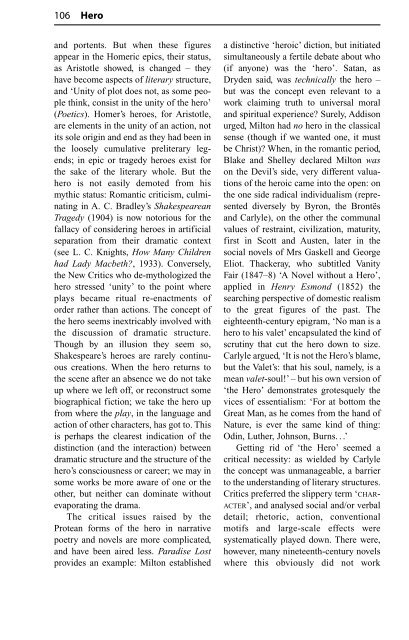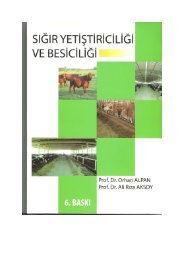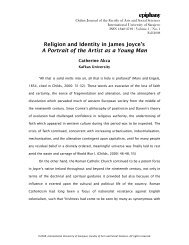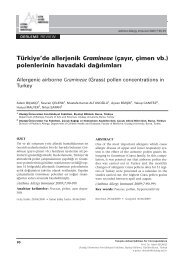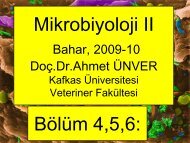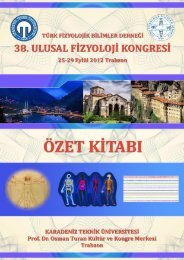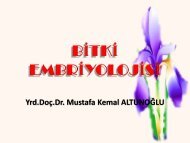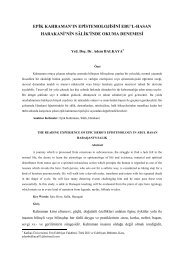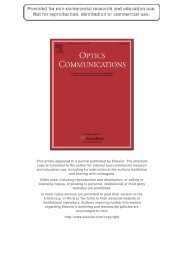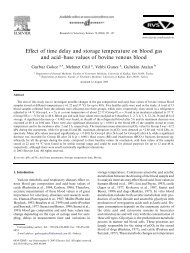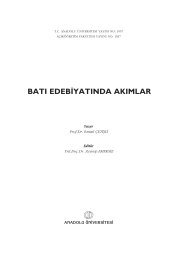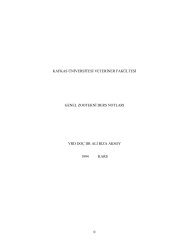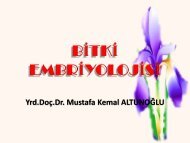The Routledge Dictionary of Literary Terms
The Routledge Dictionary of Literary Terms
The Routledge Dictionary of Literary Terms
You also want an ePaper? Increase the reach of your titles
YUMPU automatically turns print PDFs into web optimized ePapers that Google loves.
106 Hero<br />
and portents. But when these figures<br />
appear in the Homeric epics, their status,<br />
as Aristotle showed, is changed – they<br />
have become aspects <strong>of</strong> literary structure,<br />
and ‘Unity <strong>of</strong> plot does not, as some people<br />
think, consist in the unity <strong>of</strong> the hero’<br />
(Poetics). Homer’s heroes, for Aristotle,<br />
are elements in the unity <strong>of</strong> an action, not<br />
its sole origin and end as they had been in<br />
the loosely cumulative preliterary legends;<br />
in epic or tragedy heroes exist for<br />
the sake <strong>of</strong> the literary whole. But the<br />
hero is not easily demoted from his<br />
mythic status: Romantic criticism, culminating<br />
in A. C. Bradley’s Shakespearean<br />
Tragedy (1904) is now notorious for the<br />
fallacy <strong>of</strong> considering heroes in artificial<br />
separation from their dramatic context<br />
(see L. C. Knights, How Many Children<br />
had Lady Macbeth?, 1933). Conversely,<br />
the New Critics who de-mythologized the<br />
hero stressed ‘unity’ to the point where<br />
plays became ritual re-enactments <strong>of</strong><br />
order rather than actions. <strong>The</strong> concept <strong>of</strong><br />
the hero seems inextricably involved with<br />
the discussion <strong>of</strong> dramatic structure.<br />
Though by an illusion they seem so,<br />
Shakespeare’s heroes are rarely continuous<br />
creations. When the hero returns to<br />
the scene after an absence we do not take<br />
up where we left <strong>of</strong>f, or reconstruct some<br />
biographical fiction; we take the hero up<br />
from where the play, in the language and<br />
action <strong>of</strong> other characters, has got to. This<br />
is perhaps the clearest indication <strong>of</strong> the<br />
distinction (and the interaction) between<br />
dramatic structure and the structure <strong>of</strong> the<br />
hero’s consciousness or career; we may in<br />
some works be more aware <strong>of</strong> one or the<br />
other, but neither can dominate without<br />
evaporating the drama.<br />
<strong>The</strong> critical issues raised by the<br />
Protean forms <strong>of</strong> the hero in narrative<br />
poetry and novels are more complicated,<br />
and have been aired less. Paradise Lost<br />
provides an example: Milton established<br />
a distinctive ‘heroic’ diction, but initiated<br />
simultaneously a fertile debate about who<br />
(if anyone) was the ‘hero’. Satan, as<br />
Dryden said, was technically the hero –<br />
but was the concept even relevant to a<br />
work claiming truth to universal moral<br />
and spiritual experience? Surely, Addison<br />
urged, Milton had no hero in the classical<br />
sense (though if we wanted one, it must<br />
be Christ)? When, in the romantic period,<br />
Blake and Shelley declared Milton was<br />
on the Devil’s side, very different valuations<br />
<strong>of</strong> the heroic came into the open: on<br />
the one side radical individualism (represented<br />
diversely by Byron, the Brontës<br />
and Carlyle), on the other the communal<br />
values <strong>of</strong> restraint, civilization, maturity,<br />
first in Scott and Austen, later in the<br />
social novels <strong>of</strong> Mrs Gaskell and George<br />
Eliot. Thackeray, who subtitled Vanity<br />
Fair (1847–8) ‘A Novel without a Hero’,<br />
applied in Henry Esmond (1852) the<br />
searching perspective <strong>of</strong> domestic realism<br />
to the great figures <strong>of</strong> the past. <strong>The</strong><br />
eighteenth-century epigram, ‘No man is a<br />
hero to his valet’ encapsulated the kind <strong>of</strong><br />
scrutiny that cut the hero down to size.<br />
Carlyle argued, ‘It is not the Hero’s blame,<br />
but the Valet’s: that his soul, namely, is a<br />
mean valet-soul!’ – but his own version <strong>of</strong><br />
‘the Hero’ demonstrates grotesquely the<br />
vices <strong>of</strong> essentialism: ‘For at bottom the<br />
Great Man, as he comes from the hand <strong>of</strong><br />
Nature, is ever the same kind <strong>of</strong> thing:<br />
Odin, Luther, Johnson, Burns. . .’<br />
Getting rid <strong>of</strong> ‘the Hero’ seemed a<br />
critical necessity: as wielded by Carlyle<br />
the concept was unmanageable, a barrier<br />
to the understanding <strong>of</strong> literary structures.<br />
Critics preferred the slippery term ‘CHAR-<br />
ACTER’, and analysed social and/or verbal<br />
detail; rhetoric, action, conventional<br />
motifs and large-scale effects were<br />
systematically played down. <strong>The</strong>re were,<br />
however, many nineteenth-century novels<br />
where this obviously did not work


